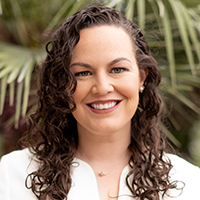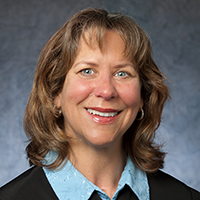
Tips from the Bench: Hon. Jill L. Burkhardt

Judicial Law Clerk at the U.S. District Court for the Southern District of California
While working for her father one summer as a teenager, U.S. Magistrate Judge Jill L. Burkhardt began to feel like she could never learn all there was to know about the job. When she shared this concern with her father, she was surprised by his response. “He told me, ‘That is the best thing you can say about any job. If you ever have a job where you can learn everything there is to learn, you will be unhappy because you will be bored.’” Having worked as a civil litigator for Baker & McKenzie, a criminal prosecutor for the U.S. Attorney’s Office, and now approaching ten years on the bench as a federal magistrate judge, Judge Burkhardt has found the legal profession to pass her father’s test. “Whenever I feel daunted by what I don’t know, I remind myself that that’s what makes this such a wonderful, fascinating career—you can be in it for decades and never stop learning.” In that spirit, Judge Burkhardt sat down to share with SDCBA’s New Lawyer Division some of the lessons she has learned throughout her illustrious career.
On Finding Your Path and Finding Value in the Detours
Although Judge Burkhardt always dreamt of becoming a lawyer, she initially envisioned exclusively practicing criminal law, a path guided in part by her experience volunteering as a rape crisis counselor in college. However, when she graduated, her path diverted in two ways: from criminal to civil and from boutique firm practice to big law. “In retrospect, even though I hadn’t intended to do civil law at all, it was a wonderful experience, and I learned a tremendous amount from it. Further, much later in my career, it made me a better judicial candidate and a much better judge, so what felt like a deviation at the time turned out to be an invaluable part of the trajectory of my career.”
Many new lawyers take jobs early in their careers that are not what they envisioned or would have chosen. Judge Burkhardt encourages lawyers to look at every experience as an opportunity. Do every job well, learn as much as you can and figure out how to use what you learn as a building block toward your longer-term goals.
On Prioritizing Your Time

Finding work-life balance is an ever-changing process that requires you to be cognizant of both your immediate priorities and the composite impact of your choices over time. “You have to keep a perspective from 30,000 feet, so that looking down, you can see the patterns,” Judge Burkhardt notes. While the balancing act between work and the other important parts of your life shifts from month-to-month, week-to-week, day-to-day, or sometimes even hour-to-hour, “when the patterns of how you spend your time overall stop being consistent with your values, then you need to rebalance.”
In a profession where 50, 60, 70+ hour work weeks can be the norm and time is measured in six-minute increments, it is all the more important to prioritize the “big things,” both professionally and personally. However, triaging is particularly difficult in a career with such high stakes and standards, which is why Judge Burkhardt also stresses the importance of trying “to forgive yourself for not being able to prioritize everything all the time.”
On Making Mistakes and Bouncing Back
One of the pitfalls Judge Burkhardt has noticed new attorneys can stumble into is overcompensating for newness, either by “pretending to know more than you know or by being defensively overly aggressive.” Aware of their inexperience and afraid of being perceived as weak, newer attorneys sometimes sacrifice civility in an effort to appear strong. However, such actions backfire by undermining your credibility and by entangling you emotionally into your advocacy in a way that doesn’t benefit your client or your reputation. It’s important to remember that “everyone you meet has the potential to help or harm your career,” so bring your best self to every situation, regardless of how others are treating you.
We all make mistakes, and sometimes we make big mistakes with significant consequences. When mistakes happen, as they will, Judge Burkhardt recommends you:
- Own up to your mistake;
- Figure out a solution and make amends if there’s a way to do so;
- Process the mistake, sitting with it long enough to take the lessons from it that you need to; but don’t dwell on it too long or define yourself by it; and
- If it’s a big mistake that is damaging to your reputation, systematically work to rebuild your reputation one positive act at a time.
On the Privilege of Practicing Law
For Judge Burkhardt, her career goals have always been shaped by her desire to both pursue intellectually stimulating work and make a positive impact through her labors. She believes that the privileges of having a license to practice law come with the responsibility to use at least some of your time and talent to make the community a better place. Regardless of where you work—public interest, private practice, public agency—you have a duty to give back. To those of us around her, Judge Burkhardt’s impact on the San Diego community is clear, not only from her lifetime of public service, but from her extensive volunteer efforts, including (by way of example) leadership on the San Diego County High School Mock Trial Committee, volunteer service as an adult literacy tutor, and active involvement in numerous legal organizations.
Whether considering how to prioritize your time, respond with civility, plan your path, or get involved with your community, Judge Burkhardt’s advice provides a great reminder for how to successfully and happily navigate a legal career. With how much lawyers invest in their profession, “you want to get to the end of your career feeling like you enjoyed the hours you put into it.”
Thank you, Judge Burkhardt, and congratulations on your ten years on the bench!